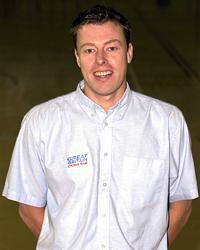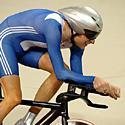
Recently on Cyclingnews.com |
News feature, April 11, 2005
Building towards Beijing: Part I
The dust has settled and the medals have been put on display. The winners' lives are returning to some vestige of normality, while the disappointed athletes have either retired, or fixed their sights onto new challenges. Athens 2004 is a fast-retreating dot in the rear view mirror; time to move on.
Attention is now turning towards the next Games, to working out what went right - or wrong - last summer and how to use that knowledge to build towards the future. In this two-part exclusive, Cyclingnews' Shane Stokes talked to coaches from Great Britain and Ireland, tracing the very different paths they will follow between now and the next Olympiad.

|
Fail to prepare, prepare to fail. The 2008 Olympics may be over three years away but the maxim holds true, with the groundwork that is being done now enhancing the chances of medals being won in Beijing.
The Great Britain track team had a strong showing in Athens 2004, with kilometre specialist Chris Hoy and pursuit rider Bradley Wiggins both taking gold medals in their events. Wiggins took two further medals, silver in the team pursuit with Steve Cummings, Paul Manning, Rob Hayles, Chris Newton and Bryan Steel and bronze in the Madison with Hayles. And while Team GB's road prospects were hit by David Millar's suspension for EPO - something he stressed was nothing to do with British Cycling - taking medals in four separate disciplines certainly provoked feelings of envy from other countries.
Great expectations
'It is enabled people to be full-time professionals rather than enthusiastic amateurs'- Simon Jones on the impact of increased funding that the British Lottery brings |
It is a reflection of British Cycling's increased expectations that head coach Simon Jones gives a mixed reaction when asked about the haul. 'I was reasonably happy with the campaign,' he tells Cyclingnews, speaking by telephone from BC's base in Manchester Velodrome. 'We went for a medal in each discipline, so I think we missed as many as we went for. The points race was a disappointment, the team sprint was a disappointment, so too the keirin with Jamie Staff being disqualified. All in all, it was a bit mixed. It was great for Bradley Wiggins and Chris Hoy to come away with what they wanted, but I think we probably could have got eight medals. So I don't see it as a complete success, really.'
'Looking back at Sydney, we had four medals there. We had Jason Queally in the kilo, silver in the team sprint, bronze in the team pursuit and bronze with Yvonne McGregor. We had the same total in Athens, although the colours are slightly different with two golds rather than one. It's slightly better. That said, I don't think you can compare the 2004 Olympics with previous campaigns because of the new funding that we have, the increased support that we get from the lottery. All you can really compare it with is what we expected going into the Games. And I expected more. We thought we had genuine medal chances in eight areas; we came out with four, which was good but not ideal.'
Results no longer a lottery

|
Over the past few decades, Great Britain has had a history of success on world level, with riders such as Tom Simpson, Barry Hoban and Robert Millar flying the flag on the road and Reg Harris, Hugh Porter and Tony Doyle doing likewise on the track. But since Chris Boardman and Graeme Obree targeted - and took - the World Hour record, the general standard has steadily improved. There are more contenders across the board and success is no longer aspired to, it is expected. The building of tracks such as Manchester and Newport plus the hugely-significant injection of National Lottery funding for cycling has helped increase the number and standard of those racing bikes.
'The funding has played a crucial part,' agrees Jones. 'It is enabled people to be full-time professionals rather than enthusiastic amateurs, in the best sense of the word. Cycling in Great Britain has gone from being a volunteer-based sport to a professionally-run one, so people have time to sit down, structure and organise a four-year cycle. It is a full-time job for a lot of people now, much as the Australians had for 25 years.'
'That said, the provision of velodromes has also played a big part. The lottery funding was definitely a big part of our success, but without the track here in Manchester, we wouldn't have had that success. I think first you've got to invest in facilities and then next comes the professional attitude and the programmes and strategy behind it. If we do get more velodromes and if we support them, and the public support them, then I think we could be more and more successful on the track.'
If that's the case, GB's rivals had better watch out. Britain's bid for the 2012 Olympic Games has already resulted in a commitment by the government to build a top-notch velodrome in London. This will be constructed whether or not the Games are actually awarded to the capital, even if erecting such a track is intended to score bonus points with the IOC and show that the country is serious about its bid.
'It's good news all right,' agrees Jones. 'I think another indoor track near a big population centre and near big cycling communities - which there are in London - will mean we get as many people coming out of that part of the world as we do out of Manchester. That can only be a good thing for the future.'
Go Ride or go find

|
Of course, once new riders try out the sport, it is important to identify those who have the potential to go on and perform on a world-class level. As Jones explains it, British Cycling has two strategies in place. The first, called Go Ride, works with clubs and deals with those who have already started cycling. The second looks to discover those who have an aptitude for the sport but who may not have thought of taking it up.
'Riders can come through either programme although I think, in the main, that those you see coming through tend to be in cycling families or from cycling backgrounds,' he says. 'At the moment it is still more of a cultural thing. If your family, your brother, whoever was in a cycling club, then you are more likely to go on to be a cyclist yourself. But that said, several kids with potential have actually come through a non-cycling background into the sport. We have a Talent Team programme which goes into schools and test the kids there via different fitness indexes. We look at sprint and endurance through three stages of testing.'
'We expect that there will be quite high levels of retirement either after the Commonwealth Games in 2006 or after Beijing'- One of Jones' key tasks is to manage the retirement of older riders |
'The first test is that we put cones out on a circuit and measure time around a set distance. The kids have sprint races, a very, very simple test. Then they have stage two testing, indoors on a turbo trainer using a mountain bike fitted with SRM Power cranks. The Talent Team programme has 40 of those bikes which go around the country, so we can actually measure the power and start looking at sprint indexes, endurance indexes, etcetera. Basically, what it all means is that you can have a good look at the kids, you can see how hard they are trying and you know how much they want to do it. And we do have those objective measures of power through the SRM system, which we do use quite extensively.'
Identifying these promising young riders is clearly a long-term measure, something that will pay off in 2012 or later. British Cycling has Academy programmes in place to support and develop under 23 competitors, and have just launched a new junior initiative called Olympic Development. But, in the meantime, it is working towards the 2008 Games in Beijing and ensuring that Britain has the best possible chance of medals there.
Taking things in twos

|
BC has a two-tiered approach, states Jones. 'We have got a programme and strategy which is about maintaining our top riders at the moment, in other words any of those that were successful in Athens or on the squad there. Then, beneath that, we have got strategy that is going to push forward our promising younger riders. Our current [Track] World's selection represents that. We have split the team between up-and-coming riders and established riders that have had a clear history of performance.'
[Editor's note: At the 2005 World Track Championships in Los Angeles, Great Britain finished second in terms of medals awarded but took the most number of world championship medals, finishing best in the Team Sprint, Team Pursuit, Women's Sprint and Madison.]
'In effect, what we are trying to do is to manage the retirement of the older riders. We expect that there will be quite high levels of retirement either after the Commonwealth Games in 2006 or after Beijing. At the moment, we are not really planning for people to stay or to go; we are just planning to make sure that we get enough people coming up and there is enough upward pleasure so that we can cope with any situation. If people carry on and they are still competitive, that is fine; we don't have an age limit on the programme. If you are 36 and still good enough to win Olympic gold, that is fine. Equally, if you are good enough to win at 26 or 22, then that is what counts.'
'Having a number of riders going for the places is important. Okay, it may give us more issues with regard our own internal selection criteria, but we do need to get people coming up and have that competition for places. It is not the older riders aren't hungry enough; they are hungry, and a lot of them are self-starters. They don't necessarily need pressure from outside. But I still think it keeps them focused.'
Logically, he feels that developing a big pool of talent is important. 'At the moment we have quite a small team. It is not like the Australian situation, where on the endurance side they could pick eight or 10 guys who could be in the final line-up. We don't have that many, so we are trying to increase our chances and increase our depth across-the-board. The value of that is if anything should happen to a rider, you have a replacement, you have choices that you can make. That is certainly better than having only one choice.'
Part II tomorrow: In complete contrast to British Cycling's attitude, infrastructure, development programs - and a decent-sized budget - Cyclingnews' Shane Stokes takes a look inside the Irish team camp, and discovers there's plenty of work to be done if the country's to be competitive at the next Olympic Games.
